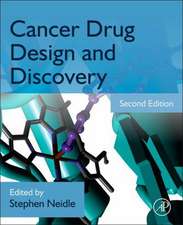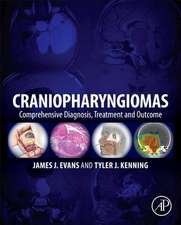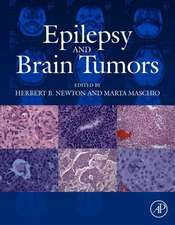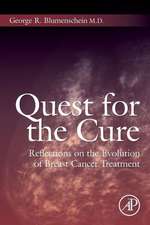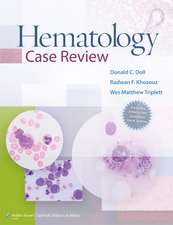Cancer Immunotherapy: Immune Suppression and Tumor Growth
Editat de George C. Prendergast, Elizabeth M. Jaffeeen Limba Engleză Hardback – 28 iul 2013
- Offers a synthesis of concepts that are useful to cancer immunologists and pharmacologists, who tend to work in disparate fields with little cross-communication
- Drs. Prendergast and Jaffee are internationally recognized leaders in cancer biology and immunology who have created a unique synthesis of fundamental and applied concepts in this important new area of cancer research
- Summarizes the latest insights into how immune escape defines an essential trait of cancer
- Includes numerous illustrations, including how molecular-targeted therapeutic drugs or traditional chemotherapy can be combined with immunotherapy to improve anti-tumor efficacy and how reversing immune suppression by the tumor can cause tumor regression
Preț: 614.58 lei
Preț vechi: 751.41 lei
-18% Nou
Puncte Express: 922
Preț estimativ în valută:
117.60€ • 123.09$ • 97.88£
117.60€ • 123.09$ • 97.88£
Carte tipărită la comandă
Livrare economică 25 martie-08 aprilie
Preluare comenzi: 021 569.72.76
Specificații
ISBN-13: 9780123942968
ISBN-10: 0123942969
Pagini: 684
Ilustrații: Illustrated
Dimensiuni: 216 x 276 x 36 mm
Greutate: 1.88 kg
Ediția:2. Auflage.
Editura: ELSEVIER SCIENCE
ISBN-10: 0123942969
Pagini: 684
Ilustrații: Illustrated
Dimensiuni: 216 x 276 x 36 mm
Greutate: 1.88 kg
Ediția:2. Auflage.
Editura: ELSEVIER SCIENCE
Public țintă
Basic, translational, and clinical cancer researchers as well as practicing oncologists and their patientsCuprins
Part I: Principles of Cancer ImmunobiologyIntroductionCancer Immunoediting: From Immune Surveillance to Immune EscapeImmunosurveillance: Innate and Adaptive Anti-Tumor ImmunityCytokine Regulation of Immune Tolerance to TumorsImmunological Sculpting: Natural Killer Cell Receptors and LigandsImmune Escape: Immunosuppressive NetworksPart II: Cancer TherapeuticsCytotoxic Chemotherapy in Clinical Treatment of CancerTargeted Therapeutics in Cancer TreatmentConcepts in Pharmacology and ToxicologyCancer Immunotherapy: Challenges and OpportunitiesCancer VaccinesPart III: Targets and Tactics to Improve Cancer Immunotherapy By Defeating Immune SuppressionImmunotherapy and Cancer Therapeutics: Why Partner?Immune Stimulatory Features of Classical ChemotherapyDendritic Cells and Co-Inhibitory MoleculesRegulatory T Cells in Tumor Immunity: Role of Toll-like Receptors Tumor-associated Macrophages in Cancer Growth and ProgressionTumor-associated Myeloid-derived Suppressor CellsProgrammed Death Ligand-1 and Galectin-1: Pieces in the Puzzle of Tumor Immune EscapeIDO in Immune Escape: Regulation and Therapeutic InhibitionArginase, Nitric Oxide Synthase, and Novel Inhibitors of L-arginine Metabolism in Immune ModulationSummary: Future Questions
Recenzii
"...an indispensable overview of immune escape as a critical trait in cancer and how applying specific combinations of immunotherapy and chemotherapy to attack this trait may radically improve the treatment of advanced disease." --Anticancer Research, January 2015
"Prendergast… and Jaffee…supply basic, translational, and clinical cancer researchers in immunology, biology, and pharmacology with 34 chapters on immunotherapy in cancer treatments. They address new principles of immune suppression in cancer and recent thinking in how immunotherapeutic and chemotherapeutic agents might be combined to defeat mechanisms of tumoral immune suppression and reprogram the inflammatory microenvironment of tumor cells to enhance long-term outcomes." --Reference and Research Book News, December 2013
"Prendergast… and Jaffee…supply basic, translational, and clinical cancer researchers in immunology, biology, and pharmacology with 34 chapters on immunotherapy in cancer treatments. They address new principles of immune suppression in cancer and recent thinking in how immunotherapeutic and chemotherapeutic agents might be combined to defeat mechanisms of tumoral immune suppression and reprogram the inflammatory microenvironment of tumor cells to enhance long-term outcomes." --Reference and Research Book News, December 2013

